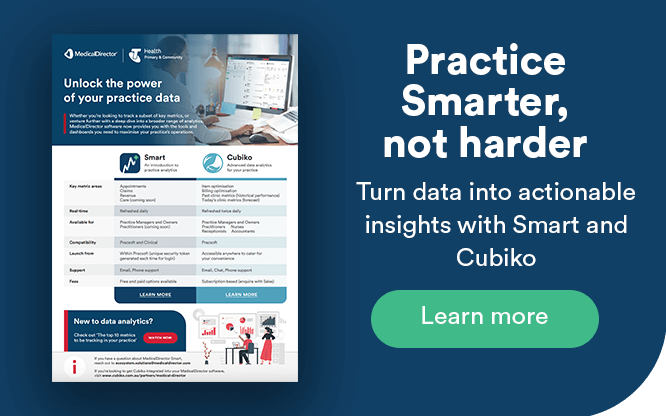How to make your specialist practice more productive
Imagine walking into your specialist practice every morning, knowing there’s no pile of paperwork waiting for you, you can see your schedule at a glance, and the phone isn’t ringing off the hook. There’s more quality time to spend with patients, the team is working together, there’s enthusiasm in the air, and there’s a shared vision to build a successful, thriving practice. Sounds familiar, or a distant dream?
In this article, we take a look at what ‘productivity’ means to a specialist practice and how achieving your ideal practice workflow and patient outcomes requires a collaborative, team effort.
What does ‘productivity’ mean to your practice?
There are lots of ways to define and measure productivity, and the concept means different things to different people. In 2002, the OECD defined ‘productivity’ as ‘the ratio of a volume measure of output to a volume measure of input.’
In healthcare, high productivity has been traditionally important to private practices to remain financially solvent. In this sense, productivity equals profitability – the bottom line is their best indicator of the productive use of resources. For others, it means seeing more patients, or processing more administrative tasks in the same time, or for the same cost. Productivity is measured by the number of patients seen, the speed as which there are seen – while being thorough at the same time.
However other specialists define productivity as seeing fewer patients in day, but spending more quality time with them, and having greater better outcomes. This ‘concierge’ model of care may seem less ‘productive’, in the traditional sense, but statistically, has proven to lead to more optimised health outcomes. These outcomes include fewer hospitalisations, better compliance with medications and better control of blood pressure. At the same time, specialists working in these practices also feel more independence and control over their schedule.
A team effort
Defining ‘productivity’ and making changes to achieve it in your specialist practice, requires a team approach. It requires the co-operation of specialists, nurse practitioners and the practice management team, with a shared vision, mission and drive.
In this environment, Forbes commentator, Robert Glatter, MD, highlighted how productivity in healthcare “should not be based on hard metrics, but patients and their specific needs, in order to produce high quality, reproducible outcomes, with attention to cost containment through evidence-based medicine.”
How technology can help
Using the right systems and tools designed for specialists, can help streamline practice workflow, improve efficiency, and support a more productive healthcare environment. Importantly, technology can support collaboration and open the lines of communication, optimising teamwork in far more powerful ways.
For Chelsea Heights Day Surgery and Endoscopy a more efficient way of managing the patient journey, from booking through to billing, invoicing and running reports meant finding a way to cut down those many micro-moments of workflow. The Surgery turned to Bluechip, by MedicalDirector, as their go-to practice management solution for boosting practice efficiency because it was software specifically designed for specialists.
“I’ve always used Bluechip and love its simplicity, but the previous software the practice was using couldn’t do day surgery seamlessly,” Practice Manager Nina Tong explained. “It couldn’t do simple things like opening up more than one patient’s file. You’d have to manually close another one – it didn’t allow us to have multiple pages open. All these things added up to make daily workflow tasks quite complicated.
Since implementing Bluechip, Chelsea Heights Day Surgery and Endoscopy has enjoyed managing the patient journey more seamlessly and a more smoother, productive environment for specialists and staff.
“We like the appointment book with its drag and drop features, and you can schedule patients for multiple bookings at the same time,” she added. “Referral bookings, running reports, simplified billing, multiple appointment books, colour coded appointment types, not to mention all the templates – all are just fantastic.”
“We particularly like how a lot of the functions, settings and features are customisable, unlike our previous solution, which we felt was too rigid to meet our needs,” she added.










